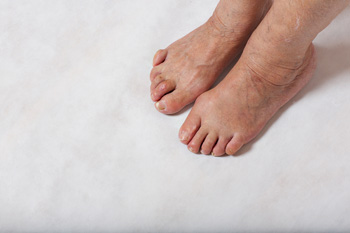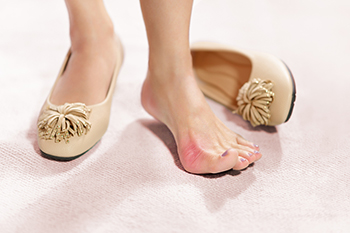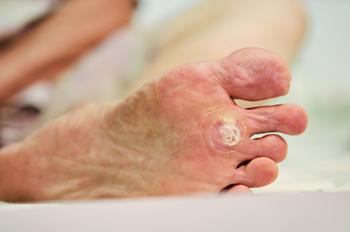Connect With Us
Blog
Items filtered by date: December 2022
Two Types of Hammertoe

Hammertoe is considered to be a foot deformity. It is a fairly common ailment and can be caused by genetic reasons, or by wearing shoes that are too tight. When these types of shoes are frequently worn, the toes can squeeze together, causing the middle joint in the second and third toes to bend down, resembling a hammer. Hammertoe can fall into two categories which are known as flexible or rigid. It is easier to treat flexible hammertoe because the joints are much more pliable, and they can be bent back to their natural place. Conversely, rigid hammertoe is considered to be severe, and surgery may be the only option for permanent straightening. Some of the symptoms that accompany hammertoe can include foot pain, corns that form on top of the toes, and the range of motion may be limited. If you have signs of developing hammertoe, please schedule an appointment with a podiatrist as quickly as possible who can help you with the treatment option that is correct for you.
Hammertoes can be a painful condition to live with. For more information, contact Dr. Eddy Caldwell of Foot Care of Northeast Arkansas, P.A.. Our doctor will answer any of your foot- and ankle-related questions.
Hammertoe
Hammertoe is a foot deformity that occurs due to an imbalance in the muscles, tendons, or ligaments that normally hold the toe straight. It can be caused by the type of shoes you wear, your foot structure, trauma, and certain disease processes.
Symptoms
- Painful and/or difficult toe movement
- Swelling
- Joint stiffness
- Calluses/Corns
- Physical deformity
Risk Factors
- Age – The risk of hammertoe increases with age
- Sex – Women are more likely to have hammertoe compared to men
- Toe Length – You are more likely to develop hammertoe if your second toe is longer than your big toe
- Certain Diseases – Arthritis and diabetes may make you more likely to develop hammertoe
Treatment
If you have hammertoe, you should change into a more comfortable shoe that provides enough room for your toes. Exercises such as picking up marbles may strengthen and stretch your toe muscles. Nevertheless, it is important to seek assistance from a podiatrist in order to determine the severity of your hammertoe and see which treatment option will work best for you.
If you have any questions, please feel free to contact our office located in Jonesboro, AR . We offer the newest diagnostic and treatment technologies for all your foot care needs.
Active Children and Foot Pain

The chances may increase for a foot injury to occur in children who participate in sports activities. These types of injuries can involve the ligaments, bones, and tendons. Fractures and sprains also fall into this category. There are two classifications of foot injuries that can develop, consisting of acute or chronic. Acute injuries consist of contusions, or bruises, fractures, and sprains. Chronic injuries can include stress fractures and tendonitis, and generally happen gradually from overuse. Parents may see symptoms in their children in the form of limping or difficulty walking. At this point, a proper diagnosis is necessary to have, which can determine what type of injury it is. Many times an X-ray or MRI is performed, and this can precede what type of treatment is needed for a complete recovery. If your child has foot pain, it is strongly urged that you seek the counsel of a podiatrist who can guide you toward helping your child find relief.
The health of a child’s feet is vital to their overall well-being. If you have any questions regarding foot health, contact Dr. Eddy Caldwell of Foot Care of Northeast Arkansas, P.A.. Our doctor can provide the care you need to keep you pain-free and on your feet.
Tips for Keeping Children's Feet Healthy
- Make sure their shoes fit properly
- Look for any signs of in-toeing or out-toeing
- Check to see if they have Clubfoot (condition that affects your child’s foot and ankle, twisting the heel and toes inward) which is one of the most common nonmajor birth defects.
- Lightly cover your baby’s feet (Tight covers may keep your baby from moving their feet freely, and could prevent normal development)
- Allow your toddler to go shoeless (Shoes can be restricting for a young child’s foot)
- Cut toenails straight across to avoid ingrown toenails
- Keep your child’s foot clean and dry
- Cover cuts and scrapes. Wash any scratches with soap and water and cover them with a bandage until they’ve healed.
If you have any questions, please feel free to contact our office located in Jonesboro, AR . We offer the newest diagnostic and treatment technologies for all your foot care needs.
Plantar Warts Can Be Treated!
Wearing High Heels May Cause a Bunion to Develop

A bunion can be unsightly. It is a bony protrusion that forms on the side of the big toe, and a severe bunion can cause the other toes to shift toward each other. It is a common foot deformity and affects women more than men. A callus may form on top of the bunion as it touches the shoe, and larger shoes may need to be purchased for a better fit. A bunion generally develops gradually, and it may form because of the shoes that are worn. Wearing high heels frequently can cause a bunion to grow and this may be due to the limited amount of room in the toe box. Medical conditions such as arthritis and flat feet may contribute to the development of a bunion. Some patients may be more at risk from genetic factors. Some of the symptoms that are often associated with bunions can include chronic toe pain, redness, and the bump may be shiny. Relief may be found when the symptoms are managed, the shoes are changed, or custom-made orthotics are worn. If you have a bunion, it is strongly urged that you consult with a podiatrist who can offer treatment options which may include surgery for permanent removal.
If you are suffering from bunions, contact Dr. Eddy Caldwell of Foot Care of Northeast Arkansas, P.A.. Our doctor can provide the care you need to keep you pain-free and on your feet.
What Is a Bunion?
A bunion is formed of swollen tissue or an enlargement of boney growth, usually located at the base joint of the toe that connects to the foot. The swelling occurs due to the bones in the big toe shifting inward, which impacts the other toes of the foot. This causes the area around the base of the big toe to become inflamed and painful.
Why Do Bunions Form?
Genetics – Susceptibility to bunions are often hereditary
Stress on the feet – Poorly fitted and uncomfortable footwear that places stress on feet, such as heels, can worsen existing bunions
How Are Bunions Diagnosed?
Doctors often perform two tests – blood tests and x-rays – when trying to diagnose bunions, especially in the early stages of development. Blood tests help determine if the foot pain is being caused by something else, such as arthritis, while x-rays provide a clear picture of your bone structure to your doctor.
How Are Bunions Treated?
- Refrain from wearing heels or similar shoes that cause discomfort
- Select wider shoes that can provide more comfort and reduce pain
- Anti-inflammatory and pain management drugs
- Orthotics or foot inserts
- Surgery
If you have any questions, please feel free to contact our office located in Jonesboro, AR . We offer the newest diagnostic and treatment technologies for all your foot care needs.
Mosaic-Type Plantar Warts

Plantar warts are significantly different from other types of regular warts. Plantar warts specifically appear as though they are growing into the skin, rather than simply growing on the skin. There are two different types of plantar warts to be aware of, mosaic-type plantar warts and myrmecial-type plantar warts. The former kind is particularly interesting. Mosaic-type plantar warts derive their name from the fact that the warts appear in groups and clusters on the feet. Unlike myrmecial-type plantar warts, this kind of plantar wart is less deep in the skin and is also smaller. Nevertheless, having plantar warts is not something to necessarily take lightly. If you think that you have plantar warts, contact a podiatrist today for treatment.
Plantar warts can be very uncomfortable. If you need your feet checked, contact Dr. Eddy Caldwell from Foot Care of Northeast Arkansas, P.A.. Our doctor will assist you with all of your foot and ankle needs.
About Plantar Warts
Plantar warts are the result of HPV, or human papillomavirus, getting into open wounds on the feet. They are mostly found on the heels or balls of the feet.
While plantar warts are generally harmless, those experiencing excessive pain or those suffering from diabetes or a compromised immune system require immediate medical care. Plantar warts are easily diagnosed, usually through scraping off a bit of rough skin or by getting a biopsy.
Symptoms
- Lesions on the bottom of your feet, usually rough and grainy
- Hard or thick callused spots
- Wart seeds, which are small clotted blood vessels that look like little black spots
- Pain, discomfort, or tenderness of your feet when walking or standing
Treatment
- Freezing
- Electric tool removal
- Laser Treatment
- Topical Creams (prescription only)
- Over-the-counter medications
To help prevent developing plantar warts, avoid walking barefoot over abrasive surfaces that can cause cuts or wounds for HPV to get into. Avoiding direct contact with other warts, as well as not picking or rubbing existing warts, can help prevent the further spread of plantar warts. However, if you think you have developed plantar warts, speak to your podiatrist. He or she can diagnose the warts on your feet and recommend the appropriate treatment options.
If you have any questions please feel free to contact our office located in Jonesboro, AR . We offer the newest diagnostic and treatment technologies for all your foot and ankle needs.






